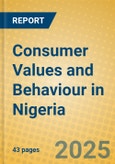The Consumer Values and Behaviour in Nigeria report analyses factors influencing national consumer expenditure. Consumer lifestyles reports include coverage of: population, urban development, home ownership, household profiles, labour, income, consumer and family expenditure, health, education, eating habits, drinking habits, shopping habits, personal grooming, clothing, leisure habits, savings and investments, media, communication, transport and travel and tourism. Use this report to understand the factors influencing a nation's lifestyle choices.
Data coverage: Market sizes (historic and forecasts), company shares, brand shares and distribution data.
Why buy this report?
- Get a detailed picture of the Consumer Values market
- Pinpoint growth sectors and identify factors driving change
- Understand the competitive environment, the market’s major players and leading brands
- Use five-year forecasts to assess how the market is predicted to develop.
Table of Contents
- Scope
- Consumer values and behaviour in Nigeria
- Nigerians are troubled by the escalating expenses associated with everyday goods
- Older generations feel they can make a difference in the world
- Consumers enjoy experimenting with novel goods and services
- Millennials extensively research the brands they use and consume
- Consumers are hopeful that their standard of living will improve
- Younger generations look forward to having more spare time
- While at home, consumers in Nigeria study
- Consumers prefer to prepare a meal themselves
- Nigerians look for healthy ingredients in food and beverages
- Nigerians say they maintain a clear separation between their professional and personal life
- Consumers in Nigeria engage in online social activities
- Millennials enjoy attending live sports games
- Consumers in Nigeria aim to make a beneficial contribution to the environment
- Nigerians say they would rather buy fewer, but higher quality things
- Gen Z loves visiting shopping malls
- Consumers consistently search for established or renowned names
- Older generations are willing to buy second-hand or previously-owned items
- Consumers in Nigeria would like to increase spending on education
- Baby Boomers set to increase spending on health and wellness the most
- Nigerians express a worry over their present economic state
- Gen Z says they can comfortably save a portion of their income
- Younger generations expect to increase overall spending
- Nigerians proactively oversee the sharing of data and privacy preferences
- Baby Boomers express discomfort with personalized advertisements
- Nigerians use communication or messaging apps
- Millennials regularly access social media accounts to edit profiles
- Younger generations frequently buys goods or services online
- Consumers in Nigeria follow or like companies' social media feed or posts
- Millennials share purchases they make with their social network








